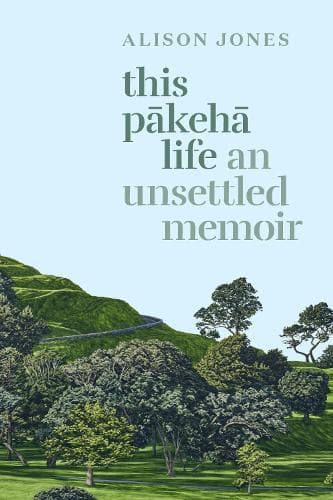This Pākehā Life: An Unsettled Memoir
Reviewed by Caroline Barron
In This Pākehā Life, Alison Jones rigorously unpicks her life to understand how she came to think of herself as Pākehā and what that word means for her and other New Zealanders. It is by no means a redemptive or self-congratulatory story of her successful interaction with Māori—which it might have been, for she has spent decades exploring the complexities of Māori-Pākehā relationships—rather, it is a rigorous investigation of self in relation to Māori.
This relational aspect of being Pākehā is at the book’s heart. Being Pākehā, as opposed to a European New Zealander, is only possible because of its relationship to Māori. Jones identifies this as “doubled being: a sense of shared humanity with Māori as well as a deep sense of otherness, of the unknown and the unknowable”.
The daughter of English immigrants, she was born near One Tree Hill, Maungakiekie in 1953. Her father moves the family every few years—from Karangahape Road in Auckland to Dannevirke, to Whakatāne, and then Tauranga—to try, Jones now believes, to outrun his depression.
The stories of her early life have a delightful, impressionistic nature that showcases her excellent writing, particularly her reminiscences of her first Māori friends, Maria and Jackie. But in the true spirit of the memoir genre, five decades on when she seeks out Maria, she realises her memories are fallible, unreliable. She had completely misremembered Maria’s domestic life—the boil-ups and the room crammed with beds— “a fantasy,” she writes, “of the imagined domestic spaces of a Māori family”.
Jones comes of age against a backdrop of Vietnam, Martin Luther King and apartheid, and becomes troubled by New Zealand’s cultural and economic disparity, and that no one seems to be talking about it. She tries on a variety of ethical models—from harvesting shared land at Waipu, to feminist politics, and left-wing Republicanism.
She studies science at Massey University in the 1970s, experiencing the sexism (and unwelcome seduction) of a male-dominated faculty. Realising she was more drawn to the “beautiful logic of scientific uncertainty”, in 1977 she begins a post-graduate degree in Education at the University of Auckland, entering “an academic pathway and close relationship with Māori from which I would not emerge”.
Five decades on, Jones is a Professor in Te Puna Wānanga, the School of Māori and Indigenous Education at the University of Auckland, whose lifetime’s research on New Zealand education was honoured with an MNZM in 2019. Two recent histories written with Kuni Kaa Jenkins have been recognised with major awards: He Kōrero – Words Between Us: Māori-Pākehā Conversations on Paper (Huia, 2011) by the Ngā Kupu Ora Māori Book Award, and Tuai: A Traveller in Two Worlds (BWB, 2017) at the Ockham New Zealand Book Awards.
So, whilst qualified to be critical of Pākehā-Māori relationships, Jones is not prescriptive or didactic. Instead she gently invites Pākehā to put aside their fear of doing the wrong thing or offending Māori, and challenges them to seek knowledge and understanding of New Zealand’s colonial past, so that all New Zealanders may move forward.
I was fascinated by Jones’s parents and would have liked more openness around the impact of her father’s mental health on her family. But that is a minor criticism which doesn’t detract from the book’s impact. This Pākehā Life is an important and timely invitation for Pākehā to look more deeply into the psychology of identity and belonging, using Jones’s own life as a starting point. By sifting through her history, set against the political and cultural time in which she has lived, the personal becomes universal.
Caroline Barron
